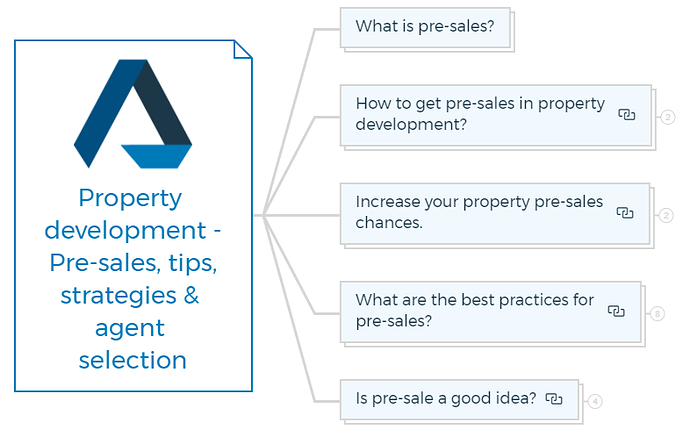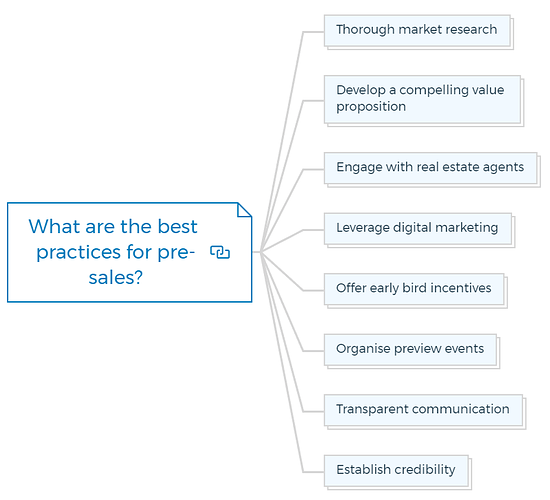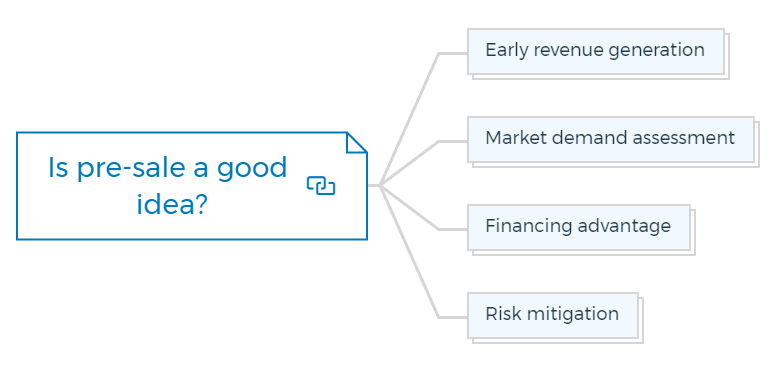Pre-Sales | Tips and Strategies & Agent Selection
What is pre-sales?
Well, as the name and the prefix ‘pre’ suggests, it is the selling of property units in advance. Before the completion of the project, if the property developer feels the need to sell some of the residential property units, it is said to be pre-sales.
Real estate developers and home buyers agree on the price at the pre-sale date, but the underlying unit will only be transferred to the buyers at completion.
This approach allows developers to secure capital early on, minimising the financial risks associated with the project. It also provides a gauge of market demand, which helps inform decision-making during the development phase.
You are missing out if you haven’t yet subscribed to our YouTube channel.
How to get pre-sales in property development?
There is a whole theory that goes beyond finding the best way to market and gets pre-sales in property development. The best way depends on the type of product you are building, i.e. commercial or residential.
Residential projects
For instance, you can market the residential projects that are above the average value for the pre-sales through:
- Identifying and reaching out to customers through their employers. Brief them about your project through in-house presentations at their work to boost your reach and generate leads for your business.
- Try to get in touch with your local real estate brokers by conducting small yet informative sessions. Brief them about the uniqueness of your project in a way that translates its features into potential benefits for the buyers. Usually, this way, such people help you find bulk orders (on subsidised rates).
- Attend seminars and trade exhibitions related to real estate to exhibit and showcase your upcoming projects to draw potential buyers’ attention. Brief the people about your project offerings and ask them to forward the details if interested.
If they reach you back, invite them over to your office or take them on-site where the project is to develop or is in the developing process. This is your chance to get to the masses.
Commercial projects
On the other hand, for Commercial Project, you may:
- Create a target list of companies (assuming you are marketing commercial office buildings) that will buy your product for their business expansion.
- Contact the companies highlighted in your list directly through their decision-makers or top management. Provide them with information through different marketing tools, i.e. Brochures, Letters, Emails or Newsletters and try to lock an appointment for an in-person discussion.
- As this is an inefficient product, marketing this sort of product requires extra effort. This industry follows a B2B sales strategy, which normally requires more effort in terms of follow-ups.
- Your clientele is the Top Tier Management that cannot be contacted frequently or could not listen to you more than once. Therefore, you should adopt a delegated, precise, and to-the-point strategy to pre-sale your product.
In addition, you need to understand that pre-sale is a difficult task to achieve. Since you have nothing on the ground and everything you have is just in papers or in your mind. Although, in some cases, pre-sales are made in the middle of the construction of the property project, that is still not the safest option to invest (according to the buyer’s point of view).
Until and unless a person has a product made ready in front of his eyes, he would be reluctant to pay for the price, which is understandably justified since you never know when the project will be completed.
However, you need to remember that as a property developer or a builder, you have every right to sell the property on your own. You can do that by choosing any of the techniques mentioned above and some websites where you can post your advertisement for the pre-sales of the property being developed.
These sites usually cost you a few thousand dollars for the package. A few examples of such websites are www.myfun.com, squarefoot.com.hk, AusProperty.cn, and www.fang.com.
Increase your property pre-sales chances.
Two contributing elements can enhance the chances of your pre-sales and boost your marketing strategy, i.e. Property Investment Analysis and Off the Plan Contract.
Property investment analysis
Property Investment Analysis plays a critical role in evaluating and assessing the project for the pre-sales and post-development sales. It would be beneficial for the buyers to have some details so that they can make their decision more accessible by having the statistics and numbers in front of their eyes.
Moreover, other than just boosting the buyer’s confidence to invest in the project, it assures him that the investment being made is safe and secure.
In your Property Investment Analysis, you can incorporate the following:
- Project Report
- Yield
- [Depreciation Schedule](Real Estate Glossary D [Part 3]
- Rental Appraisal
- Capital Growth Trends After
- After-Tax Cash flows
Off the plan contract
Off-plan property is a property before a structure has been constructed. Pre-constructions are usually marketed to real estate developers and early adopters as developments so that the purchaser can secure much better finance terms from their lenders.
When buying an off-the-plan property, the buyers need to understand the off-the-plan contract in detail and evaluate every single point.
Below mentioned is a checklist of some of the most critical elements that should be incorporated in an off-the-plan contract:
- Contract of Sale
- Disclosure Statement/Section 32
- Special Conditions
- Architectural Drawings, including Floor plans, elevations, and site layout
- Material Specifications
- Colour Specifications
- Finish Specifications
- List of Inclusions
- List of Included PC Items
- Body Corporate consists of a budget and management agreement
- Lot entitlements
- Building Format Plan
What are the best practices for pre-sales?
Here are some of the tips for successful pre-sales of property -
Thorough market research
To determine target demographics, trends, and demands, conduct thorough market research. You can use this information to adjust your products and marketing tactics to the appropriate target market.
Develop a compelling value proposition
Emphasise your development’s USPs, which may include its location, facilities, architectural style, or cost. Make a value proposition for your project that appeals to potential customers and distinguishes it from rivals.
Engage with real estate agents
Work with neighbourhood real estate agents who are well-versed in the market and have an extensive network of prospective purchasers. Your pre-sales activities will be highly benefited by their knowledge and contacts.
Leverage digital marketing
Create a strong online presence using a website that has been expertly created, social media platforms, and targeted advertising. Use virtual tours, excellent imagery, and attention-grabbing information to promote the project and spark interest.
Offer early bird incentives
Draw potential customers by providing Special Rewards for Early Adopters, such as Reduced Prices, Upgrades, or Extra Amenities. A sense of urgency and early purchases can be generated via limited-time incentives.
Learn More
Organise preview events
Hold preview events to give prospective purchasers a chance to see the development up close.
This can involve answering questions, providing project presentations, and presenting a model unit. Pre-sales are more likely to be obtained thanks to events like these that foster a personal connection.
Transparent communication
Keep lines of communication open and sincere with prospective buyers. Update them on the project’s status, handle any issues, and give them precise details on payment schedules, contract conditions, and completion dates.
Establish credibility
Showcase prior successful projects, highlight collaborations with reputable architects, contractors, or designers, and emphasise your dedication to quality and client satisfaction to establish trust and credibility.
Is pre-sale a good idea?
Yes, pre-sales can be a good idea in property development for several reasons:
Early revenue generation
Pre-sales enable developers to make money early in the development cycle, even before any physical construction has taken place.
You can use the early cash flow to pay for project expenses, fund construction, and lessen the need for additional borrowing. It aids in managing cash flow for developers and lowers project-related financial risks.
Market demand assessment
Pre-sales offer essential information about the development’s market demand. Real estate developers can determine how the market will react to their projects by evaluating the degree of interest and the number of units sold during the pre-sales period.
This data aids decision-making during the building stage and enables developers to alter the project’s specifications or cost as necessary.
Financing advantage
Pre-sales show lenders and investors that the market is viable, which makes it simpler to obtain finance for the project.
When there is proof of demand for and market interest in the venture, lenders are more willing to offer financing. Pre-sales serve as proof of concept, boosting the developer’s credibility and opportunities to secure favourable funding arrangements.
Risk mitigation
Pre-sales assist in reducing project-related risks. Before starting construction, developers can better understand the market’s acceptance of their idea by getting sales commitments.
Developers may reevaluate the viability of the project and make appropriate alterations, such as scaling back the development or altering the project’s features if pre-sales fall short of projections.
This adaptability reduces the possibility of having unsold units after completion.
Test Your Knowledge
Assignment: Understanding and Applying Property Development Marketing Strategies
Objective:
This assignment is designed to deepen your understanding of property development marketing, focusing on the creation, selection, and application of promotional materials. You will analyze various factors influencing marketing strategies, explore different types of promotional materials, and apply this knowledge by developing a comprehensive marketing plan for a hypothetical property development project.
Instructions:
Complete each section of the assignment, including the questions, tasks, and research activities. Provide detailed explanations, justifications, and any additional information that supports your answers and decisions. This assignment can be done individually or in groups, depending on the instructor’s directions.
Section 1: Understanding Promotional Materials
Define Promotional Materials
In your own words, explain what promotional materials are and their role in property development marketing.
Types of Promotional Materials
List and describe five types of promotional materials used in property development marketing, highlighting their advantages and limitations.
Section 2: Analyzing Marketing Factors
Market Research
Conduct a SWOT analysis (Strengths, Weaknesses, Opportunities, Threats) for a hypothetical property development project. Consider factors such as location, target market, competition, and economic conditions.
Selection of Promotional Materials
Based on your SWOT analysis, recommend three types of promotional materials that would be most effective for your project. Justify your choices with specific reasons.
Section 3: Cost Analysis
Costing Exercise
Estimate the budget for your selected promotional materials. Include costs such as design, production, distribution, and any digital platform fees. Discuss how currency value and outsourcing options (like in the example of China or India) could affect your budget.
Section 4: Marketing Plan Development
Creative Brief
Develop a creative brief for one promotional material of your choice (e.g., a brochure, a social media campaign, or a video). The brief should include the target audience, key messages, visual and content guidelines, and the desired action you want the audience to take.
Distribution Strategy
Outline a strategy for distributing your chosen promotional material, explaining how you will reach your target audience effectively. Consider both digital and traditional channels.
Section 5: Research and Reflection
Trends in Digital Marketing
Research and summarize current trends in digital marketing for property development. How might these trends impact the future of promotional materials in this field?
Reflective Essay
Write a reflective essay on the importance of promotional materials in property development marketing. Discuss how the choice and design of these materials can influence the success of a project. Reflect on what you learned from this assignment and how it can be applied in real-world marketing strategies.
Submission Guidelines
- Complete all assignment sections and compile your work into a single document.
- Ensure your work is well-organized, with clear headings for each section.
- Include any references used for your research and analysis.
- Submit your assignment through the mail or comments.









